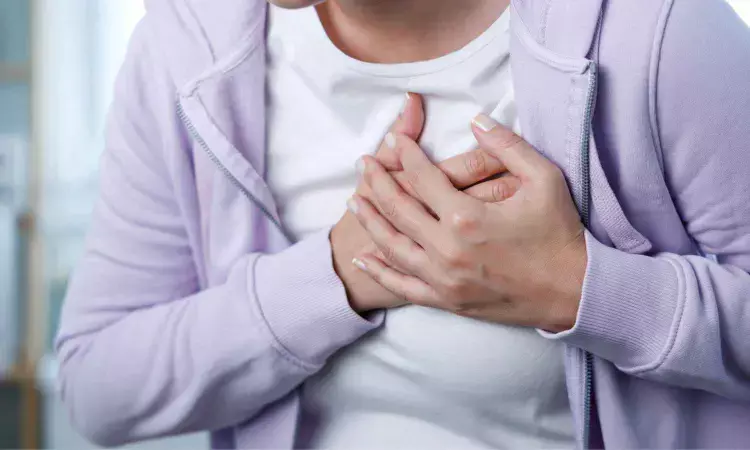- Home
- Medical news & Guidelines
- Anesthesiology
- Cardiology and CTVS
- Critical Care
- Dentistry
- Dermatology
- Diabetes and Endocrinology
- ENT
- Gastroenterology
- Medicine
- Nephrology
- Neurology
- Obstretics-Gynaecology
- Oncology
- Ophthalmology
- Orthopaedics
- Pediatrics-Neonatology
- Psychiatry
- Pulmonology
- Radiology
- Surgery
- Urology
- Laboratory Medicine
- Diet
- Nursing
- Paramedical
- Physiotherapy
- Health news
- Fact Check
- Bone Health Fact Check
- Brain Health Fact Check
- Cancer Related Fact Check
- Child Care Fact Check
- Dental and oral health fact check
- Diabetes and metabolic health fact check
- Diet and Nutrition Fact Check
- Eye and ENT Care Fact Check
- Fitness fact check
- Gut health fact check
- Heart health fact check
- Kidney health fact check
- Medical education fact check
- Men's health fact check
- Respiratory fact check
- Skin and hair care fact check
- Vaccine and Immunization fact check
- Women's health fact check
- AYUSH
- State News
- Andaman and Nicobar Islands
- Andhra Pradesh
- Arunachal Pradesh
- Assam
- Bihar
- Chandigarh
- Chattisgarh
- Dadra and Nagar Haveli
- Daman and Diu
- Delhi
- Goa
- Gujarat
- Haryana
- Himachal Pradesh
- Jammu & Kashmir
- Jharkhand
- Karnataka
- Kerala
- Ladakh
- Lakshadweep
- Madhya Pradesh
- Maharashtra
- Manipur
- Meghalaya
- Mizoram
- Nagaland
- Odisha
- Puducherry
- Punjab
- Rajasthan
- Sikkim
- Tamil Nadu
- Telangana
- Tripura
- Uttar Pradesh
- Uttrakhand
- West Bengal
- Medical Education
- Industry
Veterans with depression have increased risk of heart failure: JAMA

U.S. veterans with depression had a 14% higher risk of heart failure, a new Vanderbilt University Medical Center-led study found, even after adjusting for traditional risk factors.
The study, “Depression and Heart Failure in U.S. Veterans,” was published May 8 in the journal JAMA Network Open.
Corresponding author Evan Brittain, MD, MSCI, professor of Medicine, said the study suggests implications for patient care.
“Patients and clinicians have another reason to screen for and treat depression in order to prevent potential future heart failure,” he said.
Brittain, who holds the Cardiology Division Directorship, noted the study is the largest of its kind, analyzing a sample of 3.4 million veterans from 2000 to 2015, who received care at Veterans Administration facilities. Participants were born between 1945 and 1965, met a medical home definition (had three outpatient visits within five years), and were free of heart failure at baseline. Participants were excluded if they were younger than 18, had unknown sex data, had death within one year of meeting the definition of medical home, or had received a heart transplant before or within one year of meeting that definition.
In addition to finding that patients with depression were 14% more likely to have heart failure, the study showed depressed veterans had a higher prevalence of chronic obstructive pulmonary disease (12.9% vs. 7.1%), smoking status (43.2% vs. 34.7%) and alcohol use disorder (35.4% vs. 11.3%.)
“Among adults without significant health problems, depression was associated with an even higher risk (58%) of new heart failure during follow-up,” Brittain said.
The study concluded that further study is warranted to determine whether earlier diagnosis and treatment for depression can reduce the risk of heart failure.
“It is important to focus on assessment of depression treatment and its impact on heart failure or other cardiovascular diseases to further clarify this relationship and advise treating clinicians,” Brittain said.
Reference:
Pfaff JL, Eden SK, Kundu S, et al. Depression and Heart Failure in US Veterans. JAMA Netw Open. 2025;8(5):e259246. doi:10.1001/jamanetworkopen.2025.9246.
Dr Prem Aggarwal, (MD Medicine, DNB Medicine, DNB Cardiology) is a Cardiologist by profession and also the Co-founder and Chairman of Medical Dialogues. He focuses on news and perspectives about cardiology, and medicine related developments at Medical Dialogues. He can be reached out at drprem@medicaldialogues.in


